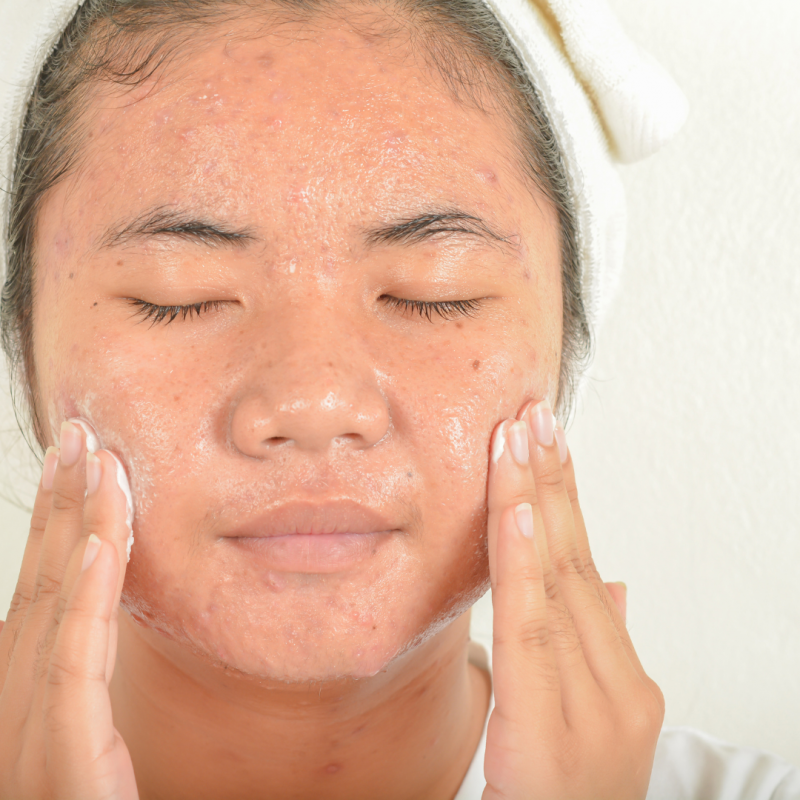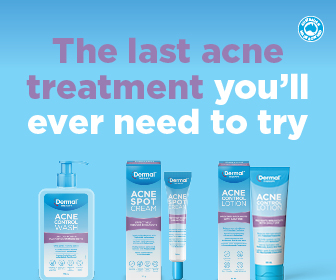Home » Featured Articles » Acne treatments can coexist with sensitive skin
Acne treatments can coexist with sensitive skin

Acne is a common skin condition affecting individuals of all genders, from the teenage years into adulthood. Lots of information exists online about managing acne, and in combination with so many different acne products available on the market, it can be overwhelming and confusing to know where to start!
One of the biggest concerns individuals have when looking for acne treatments is the effect these products might have on the skin, especially for those with sensitive skin. However, with the right skincare regime and guidance from your doctor, it is possible to clear acne without irritating or causing sensitive skin.
Myth Busting: “Acne treatments will be too harsh for my sensitive skin.”
This is a common belief, and it is understandable to not want to further aggravate acne-prone sensitive skin. Whilst some acne treatments may irritate the skin when first introduced, namely topical prescription medications like retinoids and antibiotics, these medications are slowly introduced into your skincare regime with the guidance of your doctor, and some techniques can be used to help reduce that initial irritation. However, acne treatments are not limited to just prescription medications.
Dermatologist Dr Brian De’Ambrosis says that cleansing is a key part of a good skincare regime to help fight and control acne, and a moisturiser can also help to reduce skin inflammation and irritation too!
When choosing both moisturisers and cleansers, it is important to look for ones that have a pH that ranges from 4-6 (which is close to the pH value of our natural skin’s surface), which can aid in maintaining skin moisture, help to maintain the skin barrier’s integrity and reduce inflammation. Dermal Therapy’s Acne Control Wash and Acne Control Lotion are great options to choose from.
This is a great scientific article discussing the importance of nonprescription treatments for acne.
Myth Busting: “Acne treatments will make my skin too dry.”
Another common belief amongst people with acne is that acne treatments can be too drying – and whilst there are some products and ingredients that can contribute to dryness, making sure that you are including a moisturiser that is noncomedogenic (meaning it doesn’t clog your pores) in your daily skincare routine is very important in combatting dry skin and managing your acne in most cases.
“Patients with acne can experience dry to oily skin, but moisturisers may be an option for all skin types, as some moisturisers can play an important role in maintaining the skin barrier” says Dr De’Ambrosis.
Spot treatments are effective ways of managing acne lesions that pop up and can also prevent further acne spots, with both prescription and over the counter options available. They are most effective when used in combination with a routine that includes a cleanser and generally a moisturiser. Dermal Therapy’s Acne Spot Cream is an effective over the counter option, which effectively reduces breakouts and actively controls excess oil production.
What ingredients should I stay away from when looking for acne treatments?
When looking for products to help with acne, it is important to be mindful of some ingredients that may aggravate sensitive skin. Even though skincare that smells nice can be appealing, it is generally advisable to stay away from fragranced and highly perfumed products, as for some individuals they can be very irritating to the skin. Avoid cleansers that physically scrub the skin, which can cause microtears and lead to skin irritation. You should also avoid introducing new products at high concentrations, such as retinoids or benzoyl peroxide – it is always best to start low and slow, and with the guidance of your doctor!
Whilst products that include ingredients such as salicylic acid and benzoyl peroxide are helpful in treating acne, they can sometimes be harsh on sensitive skin, and should only be introduced with the guidance of your doctor. Dermal Therapy’s Acne Control range is potentially a great option for those with sensitive skin, as it is free from salicylic acid, peroxides, bleach, soap, SLS and oil but clinically tested to reduce acne breakouts.
So, what’s the take home message?
Acne in combination with sensitive skin can be difficult to manage, but it is important to know that there are effective treatment options that will help, and not worsen your skin!
“When it comes to acne, simple is often best, with a routine that includes cleansing, in most individuals moisturising, and using a spot treatment as necessary,” says Dr De’Ambrosis.
“Seeing a GP or a Dermatologist is important when managing acne, to help identify what may be causing the acne, and to guide and alter treatment to the individual.”
Dermal Therapy’s Acne Control Kit is a potentially effective starter option for patients with sensitive skin, providing the key steps required for effective acne treatment and management. Try Dermal Therapy’s Acne control range, available at leading pharmacies across Australia.


